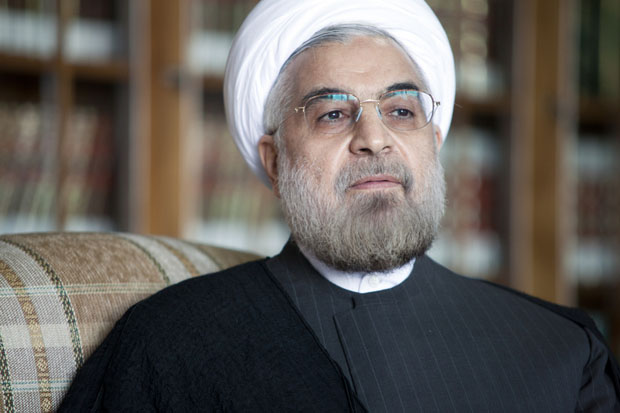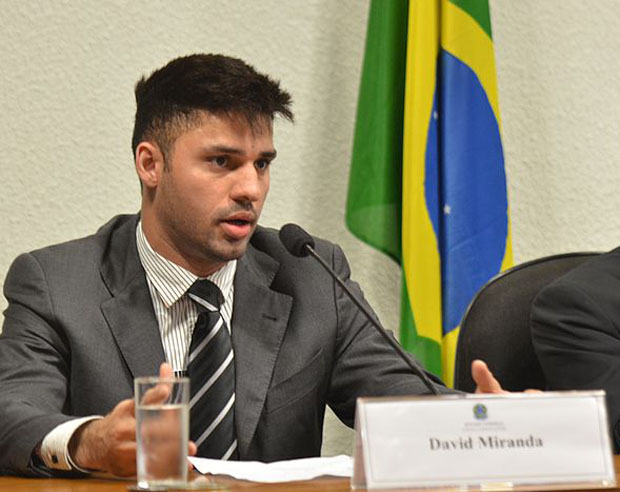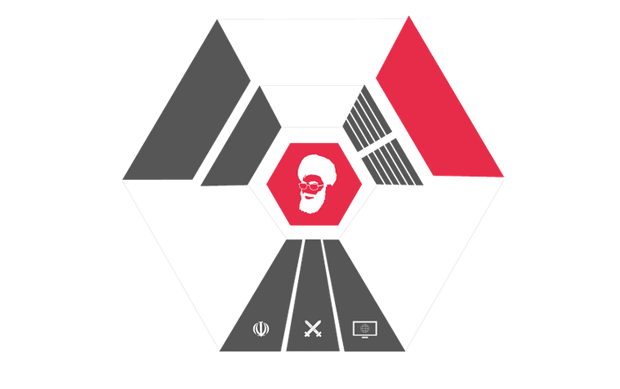4 Sep 2014 | Digital Freedom, Iran, News and features

(Image: Meysam Mim/Demotix)
President Hassan Rouhani is fond of rhetorical flourishes that promise Iranians freer access to virtually all forms of information, from satellite television to uncensored books to a less tightly-regulated press. While in all of the aforementioned areas his policies have failed, or failed to exert themselves, there is one domain where the Rouhani government has pushed forward seriously: securing Iranians better and faster internet connections, including mobile internet that would enable them to properly use the smartphones they buy with such enthusiasm.
In remarks to a group of clerics on Monday, Rouhani presented the internet as crucial to the nation’s progress in both science and academic research, areas that Supreme Leader Ali Khamenei has also identified as paramount to Iran’s development. “We cannot cannot close the gates of the world to our younger generation,” Rouhani said.
He warned that if Iran refuses to tolerate the technological needs of a savvy young generation now, “we will have to do it tomorrow. If not, the day after tomorrow.”
Though Rouhani has backtracked on a number of cultural reforms in the face of fierce hardline opposition, he has been steadfast in backing his internet ideals with hard policies. In the past two weeks, the government has granted 3G and 4G licenses to the country’s two main mobile operators, and has in recent months also permitted internet providers to increase bandwidth on home connections.
One reason why the president has been more willing to back the provision of higher speed internet is that so far, it has come at a more reasonable political price. Because service providers still implement government filters, the state censorship regime that prevents Iranians from accessing websites deemed “immoral” — everything from Facebook to many Persian news sites — will remain in place. While faster connections do mean that Iranians can more nimbly use proxy servers to get around the state filters, the speeds are still slow by developed world standards, requiring great patience from those wishing to use the internet to its full capacity. But 3G and mobile internet remain issues highly contested by hardliners made nervous by the challenges of filtering mobile devices.
Grand Ayatollah Nasser Makaram Shirazi last week issued a fatwa declaring high-speed and mobile internet haram, later comparing mobile internet to “muddy water” that requires filtering. Rouhani has sought to bypass these concerns by making the case for the internet’s importance as a research tool for scientific progress. As Rouhani joked in an 30 August press conference, the speeds that the country’s clerics are advocating are slow enough to make someone waiting to download an article fall asleep.
This framing of the issue is a canny approach, for it challenge Khamenei to back up his ardent support for Iranian scientific empowerment with policies that might otherwise make him uncomfortable. This past July at a meeting with university professors, Khamenei praised the work of the country’s “scientific movement”, saying that it “has achieved great objectives and become recognised on the international scene”.
By linking the objectives most dear to Khamenei to his own objective of pulling Iran out of the internet dark age, Rouhani is carving out a political space where his goals are seen to overlap with those of the supreme leader.
When the Committee for Determining Criminal Web Content sought to block access to the popular mobile messaging tool WhatsApp, Rouhani intervened. While this certainly endeared him to young Iranians who used the messaging service widely, Rouhani also risked riling the National Telecommunications Company, which is losing revenue as Iranians turn to cheaper foreign alternatives for messaging.
In the battle over control of the internet, there are multiple institutions across political factions vying for a role, with the competing financial interests of various mobile, 3G and telecoms providers underlaying the fray. But what’s clear is that Rouhani has chosen the internet as one of the rare areas where he will back rhetoric with clear policy.
This article was published on 4 Sept, 2014 at indexoncensorship.org
3 Mar 2014 | Iran, Middle East and North Africa, News and features

(Image: Meysam Mim/Demotix)
It has been six months since Hassan Rouhani took office as the 7th president of Iran’s Islamic government. Considering his government a moderate one, in the first weeks of his tenure, as he introduced his cabinet members, the cultural industry hoped for conditions to take a turn for the better after 8 years of suppression brought about by former president Ahmadinejad and the hardliners. Although the situation seems to be neither dramatically better nor worse, Rouhani is sending mixed messages on artistic freedom.
There have been positive steps, like in September 2013 the government reopened Iran’s House of Cinema. The former government had announced this non-governmental organisation was considered an illegal entity and dissolved it two years previously. The new Ministry of Culture announced that it had been shut down by the previous government but never dissolved, “as a registered organisation has an legal identity and cannot be dissolved by the Ministry”. Many celebrated and veteran filmmakers, even those who boycotted cinema during Ahmadinejad’s time, attended the ceremony of reopening the House of Cinema to show their support for new policies towards more freedom for artists.
There was also some good news for the literary community. Cheshmeh, a major publishing house, got its licence back in January 2014. Ahmadinejad government had revoked it in June 2012 for being “insulting to Imam Hossein, the third Imam of Shiites”. Before this accusations Cheshmeh had received several notices to stop “promoting western ideas”.
Minister of Culture and Islamic Guidance Ali Jannati, was early drawn into the spotlight, participating in press conferences about his policies on books and films. Jannati announced he would move towards removing the procedures of pre-publication licensing of books, which has sparked both new hopes and new concerns. Iranian authors saw this as a good opportunity to send their old books to publishers, but publishers were concerned that publishing books which have no guarantee of being approved, could be an expensive exercise amid paper price increases.
However, Jannati later stated that the Islamic Republic of Iran has principles that need to be upheld, and while they would need to maintain the current review and permission process, they may be able to accelerate the process. The first action of the new minister was to return books that had been in the hands of the auditing committee for an extended period of time. This did not mean that the books had been accepted, and the list of required amendments handed back to publishers and authors demonstrated that the government’s approach and attitude, at least as of yet, has not changed.
Rouhani and Ali Jannati both had meetings in the past six months with Iranian artists in both publishing and cinema, promising to pursue positive changes to facilitate the licensing procedures for books and making movies. Ali Jannati also said that artists need a secure space rather than a space controlled by security forces to be able to function. Rouhani said that art can not be commissioned or controlled. They both insist that controlling cultural industry is not the government responsibility and they suggest it would be better to shift the controlling system to the artists themselves.
Specifically regarding books, they’ve said the publishers should take the responsibility for the scrutiny of books, which diverts attention away from the government. This could pose a great danger to the publishing industry, with an increased risk that publishers could take a stricter approach to censorship than the government because they have more to lose. In a gathering with cinema industry practitioners in early January, Hassan Rouhani mentioned that now is the time to stop making sad and dark movies and encouraged movie makers to instead make hopeful and optimistic works. This seemed an official order rather than an inspiration.
The Iranian Writers Association has not been officially allowed to work or organise any gathering and event for over 15 years. In an recent interview, the cultural deputy of the Ministry of Cultural and Islamic guidance said, on the topic of the writers association resuming its activities: “Some members are dead and the rest are not into working anymore. So the Association can shed skin which is for the benefit of the Association and other writers.”
Shed skin means that the troublemakers in the eyes of the government — writers working against suppression and censorship — must leave so others could stay. The response of Writers Association was simple and clear: “If shedding skin means don’t say and don’t write, it is never possible.”
This article was posted on March 3, 2014 at indexoncensorship.org
19 Feb 2014 | Campaigns, United Kingdom

David Miranda (Image: Elza Fiúza/Agência Brasil/Wikimedia Commons)
Index on Censorship today expressed disappointment at the High Court’s dismissal of David Miranda’s application for a judicial review of the use of anti-terror laws to detain him at Heathrow Airport.
“This ruling represents a dangerous elision of terrorist activity and legitimate journalistic practice,” said Kirsty Hughes, Chief Executive of Index on Censorship. “We must hope that it will not stand as precedent, as it could seriously endanger journalists working in the public interest.”
Mr Miranda, the spouse of journalist Glenn Greenwald, was stopped and searched under Schedule 7 of the Terrorism Act 2000 on 18 August 2013. He had been carrying encrypted files and documents originating from Edward Snowden’s leak of information on the National Security Agency’s mass surveillance programme.
A coalition of media and free speech organisations, including Index on Censorship, argued that it is inappropriate to use terror laws against someone such as Miranda, who was engaged in journalistic activity in transporting the documents intended to be used as source material for news stories in the public interest.
But the High Court today ruled that the use of the Terrorism Act did not infringe David Miranda’s right to free speech, or the rights of journalists to protect sources and materials. In his judgment, Lord Justice Laws ruled that the Schedule 7 detention of Miranda had been proportionate and did not “offend” his right to free speech under the European Convention on Human Rights.
Read the full judgment here
This article was published on 19 February 2014 at indexoncensorship.org
6 Feb 2014 | Digital Freedom, Iran, Middle East and North Africa, News and features
The idea of blogging and social media in Iran was once likely to invoke images of the 2009 Green Movement, where these platforms played a part in regular people standing up to a repressive, conservative regime, calling for reforms and demanding civil liberties. These days, it may be more linked with the country’s political elites, who really seem to have taken to communicating through Twitter and Facebook — sites now blocked for most of the population.
But while it was perhaps always expected that tech-savvy, reformist activists would find ways around the social media censorship, it may come as a surprise that some of Iran’s most conservative do the same.
A new report by Small Media sheds light on the Arzeshi, a hardline, conservative faction of online activists, devoted to the principles of the 1979 revolution and the supreme leader. The report found that the Arzeshi work around online restrictions, appearing on banned sites. In particular, the report looks at blogs and Google+, and analyses the activity of 75 Arzeshi accounts on Twitter — a site that, bar a technical glitch last September, has been blocked in Iran since 2009.
However, while the government claims to have a huge number of online supporters, the report tells a different story. Far from being an active, viral network, “the vast majority” of Arzeshi sites “were poorly-connected, hardly-read, and contained unoriginal content pasted from other sites.”
James Marchant, Small Media’s Research Manager, said: “This report is the first piece of in-depth research to illustrate the reality of Iran’s secretive community of online conservative activists. It shows that contrary to all government claims, the Arzeshi community is actually very fragmented and inward-looking – it is a long way from the energetic activist army touted by senior Iranian officials.”
This article was originally published on 6 February 2014 at indexoncensorship.org



